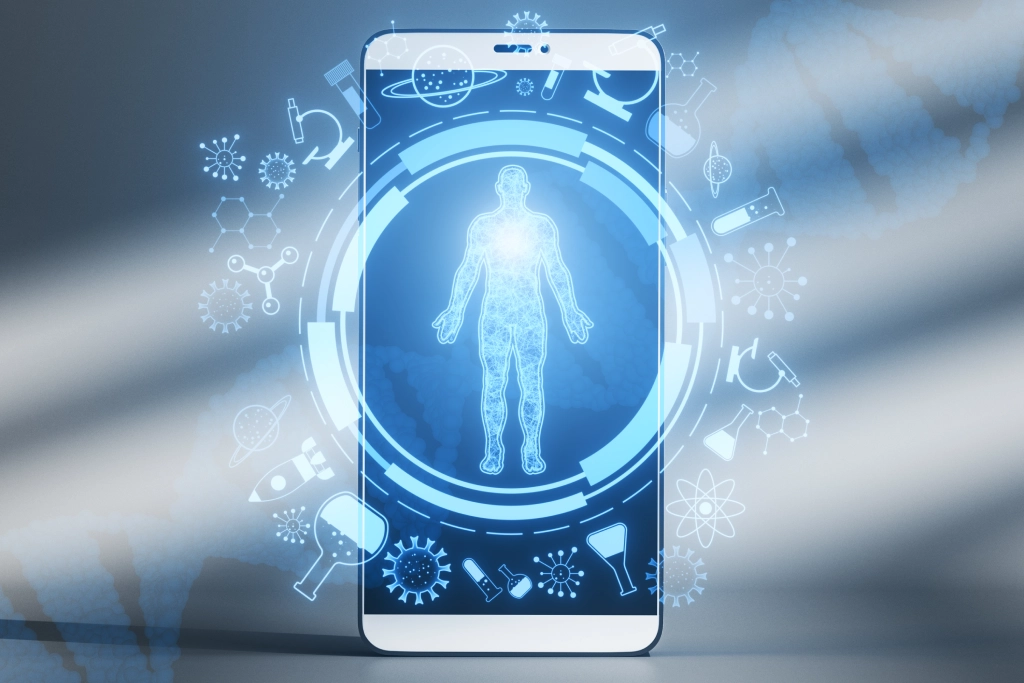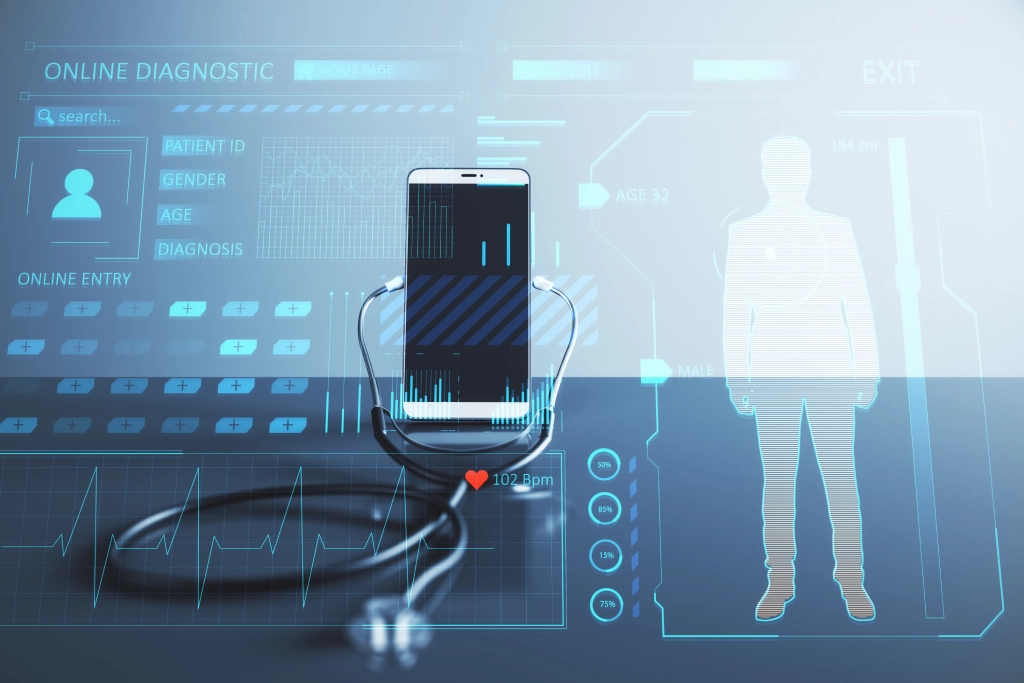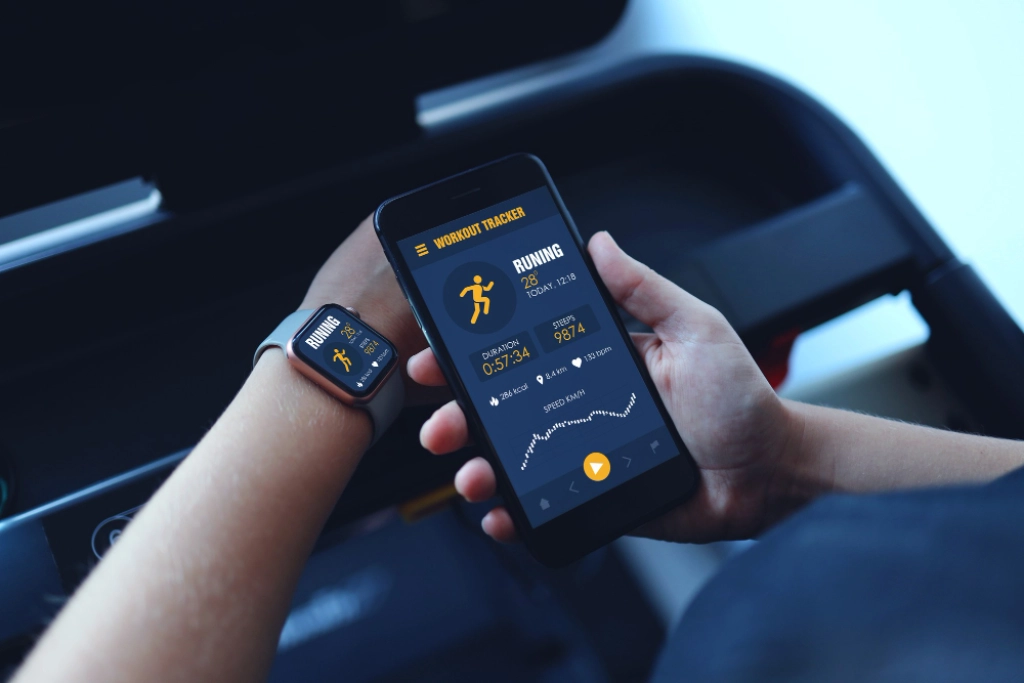Table of Contents
ToggleImagine a world where your phone doesn’t just track your steps, it keeps an eye on your heart, reminds you to take your meds, predicts potential health risks, and even chats with you about how you are feeling.
That world isn’t in the future; it’s already here.
Artificial intelligence (AI) is changing healthcare mobile apps from basic tools into smart companions for both patients and doctors.
What started as simple fitness trackers has evolved into powerful platforms that can monitor vitals, assist in diagnoses, and offer real-time support.
As we move into 2025, the impact of AI on the healthcare mobile app industry is becoming clearer and more exciting than ever.
With automation, personalized insights, and real-time responses, the future of AI in healthcare mobile apps promises better access, smarter care, and improved outcomes for all.
In this article, I will share insights from my experience, what’s working, what’s coming next, and how AI is truly reshaping the future of healthcare mobile apps.
Key benefits of AI in healthcare mobile apps
AI brings a wide range of advantages to healthcare mobile applications, making them smarter, faster, and more effective for both patients and providers.
Below are some of the most important healthcare mobile app AI integration benefits are as follows:
1. Faster Diagnosis:
AI algorithms can process complex medical data, including images, lab results, and patient histories, within seconds.
This speed enables healthcare professionals to detect diseases like cancer, infections, or heart conditions far earlier than traditional methods.
The result is a faster path to treatment, which can significantly improve patient outcomes and survival rates.
2. Personalized Healthcare:
AI can learn from an individual’s medical history, genetic makeup, lifestyle patterns, and real-time biometrics.
This allows healthcare mobile apps to create custom treatment plans, fitness goals, or medication reminders specific to each patient’s needs.
Such personalized healthcare with AI mobile apps leads to better engagement, improved adherence to therapy, and overall more effective healthcare.
3. Increased Monitoring:
With AI-powered patient monitoring mobile apps, users can continuously track vital signs like heart rate, blood pressure, and oxygen levels using their smartphones or connected wearables.
These AI-powered remote patient monitoring mobile apps alert both patients and caregivers when something is off, enabling timely interventions.
This is especially useful for managing chronic conditions or post-surgical recovery from a distance.
4. Better Decision-Making:
AI assists doctors by analyzing massive amounts of clinical data and providing evidence-based recommendations.
For example, it can flag unusual symptoms, suggest possible diagnoses, or highlight potential drug interactions.
This guidance helps medical professionals make smarter, faster, and more accurate decisions, even under pressure.
5. Cost Efficiency:
One of the most practical benefits of AI in mobile healthcare apps is its ability to reduce operational and clinical costs.
Automated features like chatbot-based triage, billing assistance, or appointment scheduling save time and cut down on human resources.
Furthermore, AI minimizes unnecessary lab tests and hospital visits by delivering precise, predictive care digitally.
All these advantages explain why AI-powered healthcare mobile applications are becoming indispensable in today’s digital health ecosystem.
While healthcare is a major sector, AI is also reshaping many other fields. You can explore more in our blog on how AI benefits mobile apps in various industries.
Types of AI technologies used in healthcare mobile apps
Behind every smart healthcare mobile app is a powerful AI engine made up of different technologies working together.
These tools help apps not only collect and process data, but also make intelligent decisions in real time. As AI in healthcare mobile apps 2025 becomes more advanced, understanding the tech stack behind these innovations is critical for developers, healthcare providers, and entrepreneurs.
Each AI technology brings unique capabilities, some power virtual assistants, while others scan medical images or predict future health risks.
The combination of these tools leads to faster diagnostics, smarter health monitoring, and personalized care delivery.
Here are some of the core AI technologies shaping modern healthcare mobile applications:
| AI Technology | Application |
| Machine Learning | Predictive health modeling and clinical decision support. |
| Natural Language Processing | Enables AI chatbots and virtual health assistants to understand user input. |
| Computer Vision | Used in medical imaging, such as analyzing X-rays and detecting skin issues. |
| Predictive Analytics | Forecasts health risks, relapses, and disease progression. |
These tools form the backbone of modern AI and machine learning healthcare apps, driving smarter care and faster outcomes.
Popular use cases of AI in healthcare mobile apps
Below is a table that highlights some of the most impactful real-world applications of AI in mobile healthcare.
These examples show how intelligent features are improving care delivery and patient engagement.
| Use Case | Description |
| AI-driven Symptom Checkers | Help users analyze symptoms and receive potential condition assessments. |
| AI Virtual Health Assistants | Guide patients with medication reminders, appointment scheduling, and FAQs. |
| AI-powered Mental Health Chatbots | Provide 24/7 emotional support and basic therapy through conversational AI. |
| Drug Interaction Prediction Tools | Alert users and providers about harmful drug combinations or alternatives. |
These use cases demonstrate how artificial intelligence in mHealth apps is increasing user experience and clinical accuracy, while making healthcare more accessible and scalable.
Challenges in AI integration with healthcare mobile apps
Despite its growing advantages, implementing AI in healthcare mobile apps isn’t without roadblocks.
There are several key challenges that must be addressed for successful adoption:
1. Regulatory Compliance: Healthcare mobile apps must follow strict laws like HIPAA, GDPR, and regional policies. Ensuring AI features comply with these evolving regulations is critical to maintain trust and legality.
2. Data Privacy & Security: AI-powered healthcare mobile applications deal with highly sensitive health data. To meet rising AI healthcare mobile app data privacy trends, strong encryption, user consent, and secure storage are essential.
3. Bias in Algorithms: AI can reflect biases from incomplete or skewed data. This may lead to unequal treatment recommendations, making fairness a major concern in AI-based healthcare decisions.
4. System Interoperability: Many healthcare systems still run on outdated infrastructure. Integrating AI with legacy platforms and EHRs can be complex and limit the full potential of automation.
Addressing all these challenges is important to ensure safe, ethical, and scalable AI integration in healthcare mobile apps, opening up its true power in patient care.
Future trends in AI for healthcare mobile app development
The healthcare mobile app development trends 2025 are being shaped by advanced AI features that improve decision-making, personalization, and real-time care.
Here are the key innovations transforming the future of AI in healthcare apps are as follows:
1. AI copilots for doctors
These smart assistants act as second brains for physicians, helping analyze patient records, suggest treatment plans, summarize clinical notes, and reduce administrative workload. This allows doctors to focus more on patients and less on paperwork.
2. Real-time clinical decision support
AI systems that offer on-the-spot recommendations during patient consultations by analyzing medical histories, lab reports, and clinical guidelines. This ensures faster, more accurate decision-making, especially in critical care settings.
3. Voice-enabled diagnostics
Patients can interact with mobile apps through voice commands, describe symptoms, and receive preliminary diagnostic insights. This hands-free experience is especially beneficial for elderly users, patients with disabilities, or when multitasking.
4. Proactive mental health interventions
AI monitors behavioral data from mobile usage, typing patterns, or voice tone to detect early signs of stress, anxiety, or depression. It can then trigger alerts, offer coping exercises, or connect users with a therapist before symptoms escalate.
Other leading core AI trends include:
1. AI and wearable health technology
Wearables integrated with AI provide real-time insights into heart rate, blood pressure, sleep patterns, and physical activity. These AI and wearable health technologies mobile apps can alert users and providers instantly if any vital signs fall outside the safe range.
2. AI-powered remote patient monitoring
Artificial intelligence in mHealth apps now enables physicians to monitor chronic conditions like diabetes, COPD, or hypertension remotely. AI analyzes the data and notifies care teams if intervention is needed, reducing unnecessary hospital visits.
3. AI-enabled digital therapeutics apps
These apps deliver evidence-based treatments for chronic and mental health conditions, such as CBT for anxiety or digital programs for managing pain, all personalized and guided by AI algorithms.
4. AI predictive analytics in healthcare apps
These systems analyze patient data to forecast health outcomes, such as disease flare-ups, medication adherence issues, or risk of hospitalization. This empowers providers to act before problems arise.
5. AI in AR/VR healthcare applications
Combining AI with augmented and virtual reality enables immersive training for surgeons, gamified rehab for patients, and even VR therapy for anxiety disorders, creating engaging and effective care experiences.
All these powerful innovations show how the future of AI in healthcare mobile apps is not just smarter, but also more proactive, responsive, and human-centered.
As these technologies mature, they promise to transform how healthcare is delivered through mobile platforms.
How AlphaKlick can help build AI-powered healthcare mobile apps
Bringing AI into healthcare mobile apps isn’t just about adding technology; it’s about solving real problems with smart, reliable solutions. At AlphaKlick, we focus on building AI-powered mobile apps that actually make life easier for both patients and healthcare providers.
We design each feature, such as virtual health assistants, real-time monitoring, and predictive alerts, to be simple, secure, and genuinely useful.
As a leading React Native mobile app development company in India, we build cross-platform apps that are fast, cost-effective, and work smoothly on both Android and iOS.
Our team blends deep healthcare industry knowledge with hands-on AI expertise to deliver solutions that are ready for today and built for the future.
If you are planning to launch a smart healthcare mobile app, you can book a free consultation call with our AI mobile app development experts. We would love to explore your idea and help you bring it to life.
Frequently Asked Questions (FAQ)
Question: How is AI used in healthcare mobile apps?
Answer: AI powers features like symptom checkers, virtual health assistants, diagnostic tools, and personalized treatment suggestions based on user data.
Question: Are AI healthcare apps safe to use?
Answer: Yes, when built with secure protocols and validated medical data, AI apps can enhance care. However, they should support, not replace, professional medical advice.
Question: What are the benefits of AI in health apps?
Answer: AI helps improve diagnosis accuracy, enables 24/7 support, personalizes health tracking, and streamlines patient-doctor communication.
Question: How much does it cost to build a healthcare mobile app?
Answer: The cost to build a healthcare mobile app with AI features typically ranges from $7,200 – $30,000+, depending on complexity, features, platform, and compliance needs.
Question: How much does it cost to hire top mobile app development companies in India?
Answer: Costs vary based on project complexity, but top mobile app development companies in India offer competitive pricing for quality, custom solutions.
Question: Does using AI increase pharmacy app development cost?
Answer: Yes, adding AI features like chatbots, prescription scanning, and predictive analytics can raise the pharmacy app development cost initially, but they help automate processes and reduce operational expenses over time.

